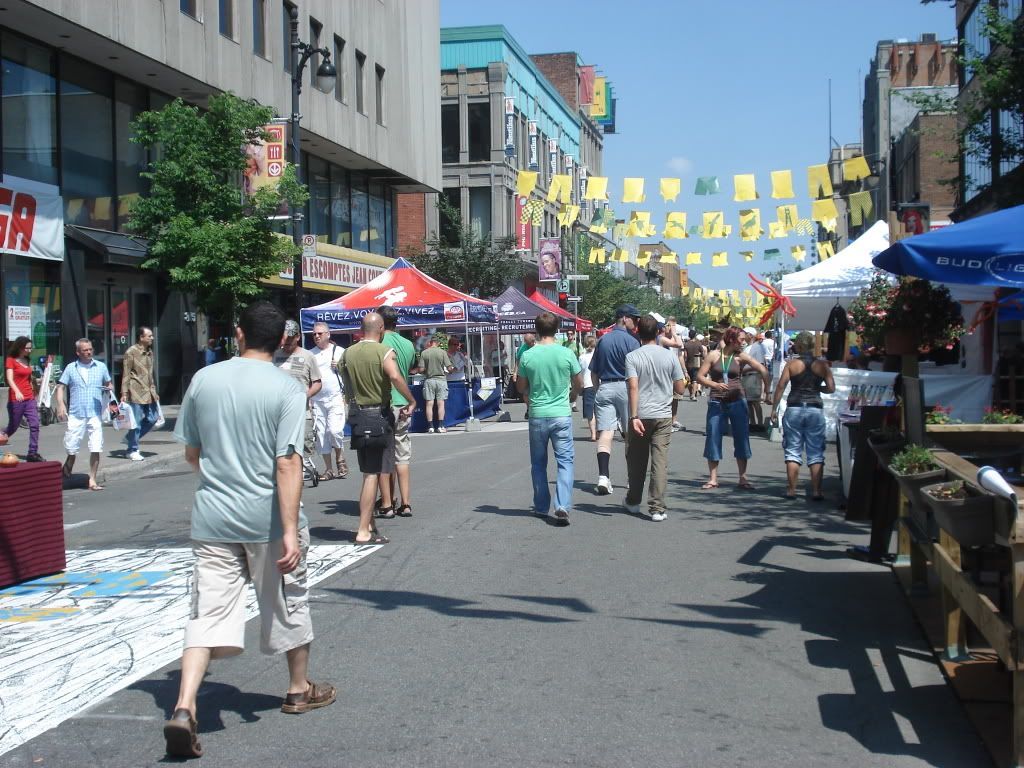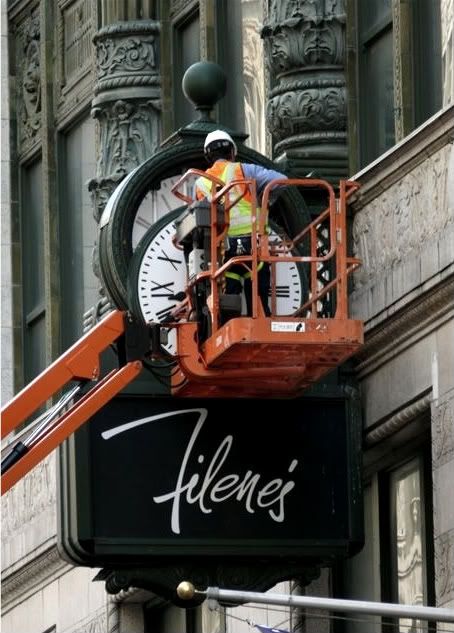You are using an out of date browser. It may not display this or other websites correctly.
You should upgrade or use an alternative browser.
You should upgrade or use an alternative browser.
Downtown Crossing/Financial District | Discussion
- Thread starter KentXie
- Start date
Boston02124
Senior Member
- Joined
- Sep 6, 2007
- Messages
- 6,893
- Reaction score
- 6,639
It was a lot more active/busy yesterday around 4pm lots of high school student/cops!
JohnAKeith
Senior Member
- Joined
- Dec 24, 2008
- Messages
- 4,337
- Reaction score
- 82
The summer jobs program started yesterday or the day before, maybe that was the reason?
tobyjug
Senior Member
- Joined
- Jul 21, 2007
- Messages
- 3,408
- Reaction score
- 473
There was a Latin boy band called "Aventura" autographing albums, undergarments, body parts, etc. The lads seemed to attract throngs of admiring young females. There was at least one stretch hummer that everyone could see in the street.
Boston02124
Senior Member
- Joined
- Sep 6, 2007
- Messages
- 6,893
- Reaction score
- 6,639
That must of been it!
Some news....
http://www.boston.com/business/articles/2009/07/10/office_rental_rates_fall_in_hub/?p1=Well_MostPop_Emailed7
Boston?s office market is experiencing the sharpest drop in rental rates in nearly a decade, with the supply of vacant space continuing to increase as employers cut back during the economic slowdown.
Average asking rents in Greater Boston plunged to $28.11 per square foot in the second quarter of 2009, a 12 percent decline from the same period last year, according to Lincoln Property Co., a real estate services firm. Rents are at their lowest level since 2001.
The drop-off is being felt throughout the market, from downtown Boston to the outer suburbs, reflecting the pervasive impact of the recession. Those shedding space include financial and law firms in Boston, pharmaceutical and technology firms along Interstate 495, and Cambridge consulting companies.
?The downturn is much broader and deeper this time,?? said Mike Edward, head of brokerage for Lincoln. ?In 2001, it was the tech sector, but now it?s really spread across all industries.??
Companies are flooding the market with space available for sublease, a measure of the weakness in the real estate market. There is now more than 5.1 million square feet of sublease space across the region, 40 percent more than a year ago, according to the real estate firm Jones Lang LaSalle.
Among newly available space is 134,000 square feet at 100 Federal St. that was used by financial giant Wellington Management and 88,000 square feet at Thomson Place from Cengage Learning Inc., an educational publishing firm. IBM Corp., Harvard Pilgrim Health Care Inc., and the law firm Ropes & Gray LLP are also trying to lease out blocks of space.
While the market changes are not as extreme as in 2001, real estate specialists said the upheaval is far from over.
?Space is going to continue to come on the market, and rents are going to be flat for three to four years,?? said Joe Sciolla, managing principal of Cresa Partners, an advisory firm that exclusively represents office tenants. ?I don?t see employment coming back right away to substantiate rent growth.??
In the meantime, some firms are taking advantage of the down market to upgrade. ITG Inc., a financial services firm, is moving to 100 High St., a 28-story tower in the Financial District, a significant step up from the pair of low-rise buildings it now occupies on the South Boston Waterfront.
?The timing worked to our advantage,?? said Carolyn Freeland, a spokeswoman for ITG. She declined to disclose the firm?s rent at 100 High St. but indicated ITG was able to benefit from the market conditions.
Edward, the brokerage chief for Lincoln Property, said bargain hunters are bringing the market back to life, but the volume of transactions is still low and will remain so for many months.
?I?m hoping we?ll bottom out in the middle of next year, and then we?ll begin the climb back,?? he said.
Casey Ross can be reached at cross@globe.com.
http://www.boston.com/business/articles/2009/07/10/economy8217s_woes_check_in_at_hotels/
The news is bad for Boston?s hotel industry this year, but it will be better in 2010, according to recent forecasts released by two local hospitality consultant groups.
As Americans cut back on business and leisure travel during the recession, occupancy and room rates, as well as revenue per available room, are expected to fall dramatically this year. But the studies suggest Boston-area hotels have reached bottom, and the numbers are expected to improve next year.
At Boston-area hotels, revenue per available room - a key measure that factors in both occupancy and average daily room rates - is expected to fall 19.5 percent this year compared with 2008, according PKF Hospitality Research. In 2010, the decline is expected to be just half a percent.
?We?re not growing necessarily, we?re just doing less bad,?? said Reed Woodworth, vice president of PKF Consulting.
Pinnacle Advisory Group is predicting a 13.2 percent drop in revenue per available room among suburban hotels inside Interstate 495 this year, and an 18.1 percent fall at Boston and Cambridge properties. In 2010, those numbers are expected to improve to 3 and 5.4 percent declines, respectively.
Nationally, hotel revenue per available room is expected to plunge about 18 percent this year and 3 percent next year, according to the average of figures from both hospitality groups.
?I don?t have any good news to share with you,?? said Pinnacle co-owner Rachel Roginsky at the Sheraton Boston Hotel yesterday during the Outlook Boston presentation, an annual lodging industry forecast meeting.
Luxury properties have been the hardest hit by the recession. The revenue per available room at hotels with daily rates averaging more than $200 a room are expected to fall 22.1 percent from 2008 to 2009, according to PKF; occupancy is forecast to be down 14.7 percent.
Business travelers who might normally stay at ultraswanky hotels like the Mandarin Oriental, which opened last fall on Bolyston Street, are now trading down to more affordable hotels, Woodworth said. But he said luxury hotels in the suburbs - such as upscale boutique Hotel Indigo in Newton, a former Holiday Inn that got a $19.5 million makeover and reopened as an upscale boutique hotel in January 2008 - have probably been hurt even more.
?The worst thing to be right now is a bigger, more expensive property located outside the city of Boston,?? he said.
The Hotel Indigo and the Mandarin Oriental did not return calls seeking comment.
Collegiate Hospitality, which owns the Inn at Harvard and the Harvard Square Hotel, is experiencing declines at both its properties, but the numbers are worse at its upscale hotel. The Inn, which has rooms starting around $199, has had a 17 percent decline in occupancy and a 15 percent drop in revenue from January to June of this year compared with the same period last year. At the lower-priced Harvard Square Hotel, with rooms starting at $159, occupancy and revenue have fallen 7 percent and 8 percent, respectively.
?We?re certainly seeing a shift?? toward less expensive lodging, said revenue manager Caitlin MacNeil.
Hotels are dropping their rates to attract more budget-conscious travelers. Pinnacle is projecting that the average daily room rate this year will drop 5 percent in suburban hotels and 11 percent in Boston. In 2010, average room rates are expected to be down 4 percent and 3 percent in Boston and the suburbs, respectively.
But lowering prices can do more harm than good - a ?death spiral of discounting,?? as Woodworth puts it, that takes profits off the table. Indeed, from July until the end of the year, delinquencies are expected to double and foreclosures are expected to triple, according Trepp, a New York company that tracks commercial mortgages.
Boston?s hotels are faring about as well as those in the other top 25 markets, Pinnacle consultants said. And in 2011, the Boston area outlook will get considerably sunnier, according to PKF Hospitality, which is predicting a 10.6 percent increase in hotel revenue per available room that year.
One factor contributing to next year?s improved outlook is the lack of new hotels being built. Two new hotels are slated to open in Boston this year - the W Hotel and the Ames Hotel. But after years of steady growth, there are none opening in 2010, Pinnacle reported, which should help bring supply and demand closer together. Still, ?We?re not going to get back to 2007 performance,?? Woodworth warned, ?until 2013 or 2014.??
Katie Johnston Chase can be reached at johnstonchase@globe.com
http://www.boston.com/business/articles/2009/07/10/office_rental_rates_fall_in_hub/?p1=Well_MostPop_Emailed7
Boston?s office market is experiencing the sharpest drop in rental rates in nearly a decade, with the supply of vacant space continuing to increase as employers cut back during the economic slowdown.
Average asking rents in Greater Boston plunged to $28.11 per square foot in the second quarter of 2009, a 12 percent decline from the same period last year, according to Lincoln Property Co., a real estate services firm. Rents are at their lowest level since 2001.
The drop-off is being felt throughout the market, from downtown Boston to the outer suburbs, reflecting the pervasive impact of the recession. Those shedding space include financial and law firms in Boston, pharmaceutical and technology firms along Interstate 495, and Cambridge consulting companies.
?The downturn is much broader and deeper this time,?? said Mike Edward, head of brokerage for Lincoln. ?In 2001, it was the tech sector, but now it?s really spread across all industries.??
Companies are flooding the market with space available for sublease, a measure of the weakness in the real estate market. There is now more than 5.1 million square feet of sublease space across the region, 40 percent more than a year ago, according to the real estate firm Jones Lang LaSalle.
Among newly available space is 134,000 square feet at 100 Federal St. that was used by financial giant Wellington Management and 88,000 square feet at Thomson Place from Cengage Learning Inc., an educational publishing firm. IBM Corp., Harvard Pilgrim Health Care Inc., and the law firm Ropes & Gray LLP are also trying to lease out blocks of space.
While the market changes are not as extreme as in 2001, real estate specialists said the upheaval is far from over.
?Space is going to continue to come on the market, and rents are going to be flat for three to four years,?? said Joe Sciolla, managing principal of Cresa Partners, an advisory firm that exclusively represents office tenants. ?I don?t see employment coming back right away to substantiate rent growth.??
In the meantime, some firms are taking advantage of the down market to upgrade. ITG Inc., a financial services firm, is moving to 100 High St., a 28-story tower in the Financial District, a significant step up from the pair of low-rise buildings it now occupies on the South Boston Waterfront.
?The timing worked to our advantage,?? said Carolyn Freeland, a spokeswoman for ITG. She declined to disclose the firm?s rent at 100 High St. but indicated ITG was able to benefit from the market conditions.
Edward, the brokerage chief for Lincoln Property, said bargain hunters are bringing the market back to life, but the volume of transactions is still low and will remain so for many months.
?I?m hoping we?ll bottom out in the middle of next year, and then we?ll begin the climb back,?? he said.
Casey Ross can be reached at cross@globe.com.
http://www.boston.com/business/articles/2009/07/10/economy8217s_woes_check_in_at_hotels/
The news is bad for Boston?s hotel industry this year, but it will be better in 2010, according to recent forecasts released by two local hospitality consultant groups.
As Americans cut back on business and leisure travel during the recession, occupancy and room rates, as well as revenue per available room, are expected to fall dramatically this year. But the studies suggest Boston-area hotels have reached bottom, and the numbers are expected to improve next year.
At Boston-area hotels, revenue per available room - a key measure that factors in both occupancy and average daily room rates - is expected to fall 19.5 percent this year compared with 2008, according PKF Hospitality Research. In 2010, the decline is expected to be just half a percent.
?We?re not growing necessarily, we?re just doing less bad,?? said Reed Woodworth, vice president of PKF Consulting.
Pinnacle Advisory Group is predicting a 13.2 percent drop in revenue per available room among suburban hotels inside Interstate 495 this year, and an 18.1 percent fall at Boston and Cambridge properties. In 2010, those numbers are expected to improve to 3 and 5.4 percent declines, respectively.
Nationally, hotel revenue per available room is expected to plunge about 18 percent this year and 3 percent next year, according to the average of figures from both hospitality groups.
?I don?t have any good news to share with you,?? said Pinnacle co-owner Rachel Roginsky at the Sheraton Boston Hotel yesterday during the Outlook Boston presentation, an annual lodging industry forecast meeting.
Luxury properties have been the hardest hit by the recession. The revenue per available room at hotels with daily rates averaging more than $200 a room are expected to fall 22.1 percent from 2008 to 2009, according to PKF; occupancy is forecast to be down 14.7 percent.
Business travelers who might normally stay at ultraswanky hotels like the Mandarin Oriental, which opened last fall on Bolyston Street, are now trading down to more affordable hotels, Woodworth said. But he said luxury hotels in the suburbs - such as upscale boutique Hotel Indigo in Newton, a former Holiday Inn that got a $19.5 million makeover and reopened as an upscale boutique hotel in January 2008 - have probably been hurt even more.
?The worst thing to be right now is a bigger, more expensive property located outside the city of Boston,?? he said.
The Hotel Indigo and the Mandarin Oriental did not return calls seeking comment.
Collegiate Hospitality, which owns the Inn at Harvard and the Harvard Square Hotel, is experiencing declines at both its properties, but the numbers are worse at its upscale hotel. The Inn, which has rooms starting around $199, has had a 17 percent decline in occupancy and a 15 percent drop in revenue from January to June of this year compared with the same period last year. At the lower-priced Harvard Square Hotel, with rooms starting at $159, occupancy and revenue have fallen 7 percent and 8 percent, respectively.
?We?re certainly seeing a shift?? toward less expensive lodging, said revenue manager Caitlin MacNeil.
Hotels are dropping their rates to attract more budget-conscious travelers. Pinnacle is projecting that the average daily room rate this year will drop 5 percent in suburban hotels and 11 percent in Boston. In 2010, average room rates are expected to be down 4 percent and 3 percent in Boston and the suburbs, respectively.
But lowering prices can do more harm than good - a ?death spiral of discounting,?? as Woodworth puts it, that takes profits off the table. Indeed, from July until the end of the year, delinquencies are expected to double and foreclosures are expected to triple, according Trepp, a New York company that tracks commercial mortgages.
Boston?s hotels are faring about as well as those in the other top 25 markets, Pinnacle consultants said. And in 2011, the Boston area outlook will get considerably sunnier, according to PKF Hospitality, which is predicting a 10.6 percent increase in hotel revenue per available room that year.
One factor contributing to next year?s improved outlook is the lack of new hotels being built. Two new hotels are slated to open in Boston this year - the W Hotel and the Ames Hotel. But after years of steady growth, there are none opening in 2010, Pinnacle reported, which should help bring supply and demand closer together. Still, ?We?re not going to get back to 2007 performance,?? Woodworth warned, ?until 2013 or 2014.??
Katie Johnston Chase can be reached at johnstonchase@globe.com
pelhamhall
Active Member
- Joined
- Jan 4, 2008
- Messages
- 855
- Reaction score
- 0
the pair of low-rise buildings it now occupies on the South Boston Waterfront.
Hey intern/journalist, the correct name is "Seaport District" - even Boss Menino uses it now. Somebody tell this kid that Jimmy Kelly died and we don't have to use 'SBW' any more!
statler
Senior Member
- Joined
- May 25, 2006
- Messages
- 7,939
- Reaction score
- 547
Hey intern/journalist, the marketing term is "Seaport District" - even Boss Menino uses it now. Somebody tell this kid that Jimmy Kelly died and we don't have to use 'SBW' any more!
Fixed that for you.
pelhamhall
Active Member
- Joined
- Jan 4, 2008
- Messages
- 855
- Reaction score
- 0
Haha - Statler, I love it!
JohnAKeith
Senior Member
- Joined
- Dec 24, 2008
- Messages
- 4,337
- Reaction score
- 82
From this week's Boston Courant (edited for clarity)
Residents Forming Neighborhood Group
by Jeb Bobseine, Boston Courant
What an a-hole.
Residents Forming Neighborhood Group
by Jeb Bobseine, Boston Courant
Downtown Crossing dwellers are banding together to lobby for the area's permanent residential population ...
... The association will draw members from buildings such as Tremont-on-the Common and the Ritz Carlton's Avery Street Towers, but any permanent resident of the Downtown Crossing area is welcome to join, [George] Coorsen stressed ...
... Members must be "stakeholders, not transients," Coorsen explained. This rules out, as one example, Suffolk University students.
What an a-hole.
tobyjug
Senior Member
- Joined
- Jul 21, 2007
- Messages
- 3,408
- Reaction score
- 473
And as another example, he rules out that thriving DTX entrepreneurial class-panhandlers, who live in the neighborhood flophouses!
I never realized that we were so elite that anyone should be excluded! I feel so special.
I never realized that we were so elite that anyone should be excluded! I feel so special.
JohnAKeith
Senior Member
- Joined
- Dec 24, 2008
- Messages
- 4,337
- Reaction score
- 82
So it also rules out renters, I assume?
So, what, you have to bring your condo deed with you when you sign up?
So, what, you have to bring your condo deed with you when you sign up?
I don't understand why they wouldn't want students to participate in the community as any other resident would. And to be clear, this is what they are, even if they know in advance it will only last 3-4 years. They buy food. Their (rent/dorm fees) pay trash, water, city service. They eat at local restaurants, see movies.
Crap.
(Edit to add: sorry, the student-hate is really getting to me. In this economy, marginalizing one of the few classes with income to spend in the city is ridiculous. They could take their dollars to another, more student-friendly city.)
Crap.
(Edit to add: sorry, the student-hate is really getting to me. In this economy, marginalizing one of the few classes with income to spend in the city is ridiculous. They could take their dollars to another, more student-friendly city.)
tobyjug
Senior Member
- Joined
- Jul 21, 2007
- Messages
- 3,408
- Reaction score
- 473

Thursday evenings Toby likes a drink, but this stuff is rotgut. Let's go for a walk.

What's this I see? Girls with turntables? Must get closer!~

It appears to be a beer garden in my own little neighborhood!
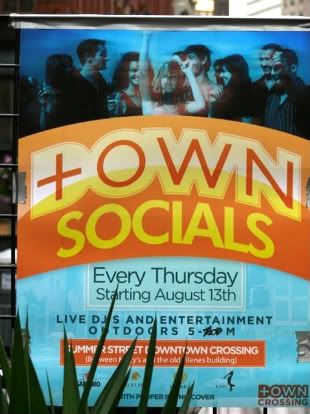
Doesn't say anything about "Dogs prohibited"! What the hell, bums, sorry, the "residentially challenged", were pissing right here ten minutes ago.
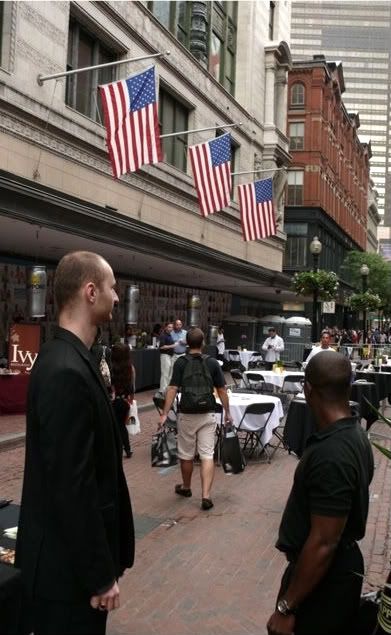
Let's go in and see.
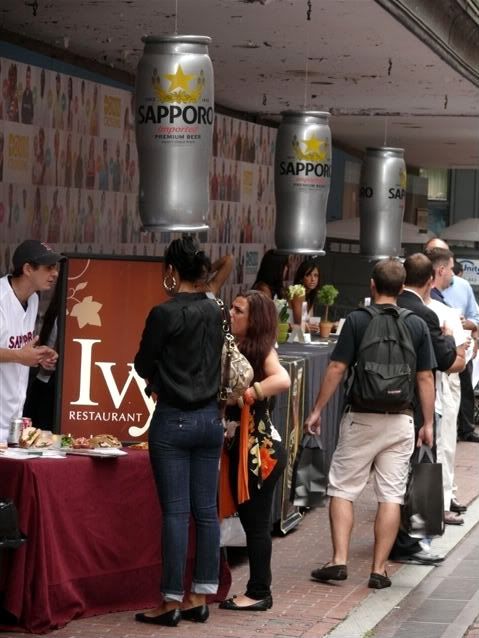
Now those are Toby sized beer cans!

That girl's a genius!

Whoa! This is a Mensa convention!
Oh, Mr. Mayor, you are working on my vote!
palindrome
Senior Member
- Joined
- Jun 11, 2006
- Messages
- 2,281
- Reaction score
- 131
I got an email for that "downtown social" from Ivy restaurant on Temple.
Based on the pics, i certainly need to check it out!!

Based on the pics, i certainly need to check it out!!

blade_bltz
Active Member
- Joined
- Jul 9, 2006
- Messages
- 808
- Reaction score
- 0
Not quite as raucous as, say, a beer garden on a Tokyo rooftop in August, but hey...progress?
KentXie
Senior Member
- Joined
- May 25, 2006
- Messages
- 4,195
- Reaction score
- 766
This is exactly what DT needs more of. They need more stalls and stands. I recently came back from Montreal and they have an area at my hotel that is pedestrian only. The place has a lot of traffic activities. I'm not exactly sure what some of the stands were (didn't understand French) but i'm pretty sure it's a bunch of advertisements. They also had a mist tunnel:
